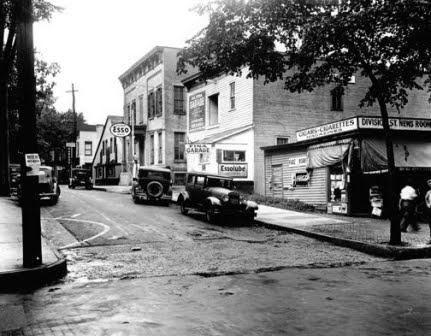Death of a Grandfather
A black wreath collects flakes of snow for the fruit man.
A black wreath nailed to the old wooden door while snow
as white as John’s soul decorates a wreath.
Spheres of crystal once frozen, cry from the upstairs
porch, above a wide plank wooden porch. The
morning sun kisses the path, allowing men and
women to safely ascend the steps; dressed in black,
crying frozen tears.
A footstep crushes a dead leaf, it’s November.
Women carry trays of food, their heads bent forward,
bowed in prayer, forward to hide emotions, or simply
bowed to step carefully and cursing winter. Women
with naked legs, rolled down stockings, and a black
over coat. A veil hides tears, only God knows.
“God, why have you taken John, a young man, a
husband, a father of three sons?”
A woman stares at the man climbing the stairs, her
head shakes back and forth as if she too is wondering
about God.
“He wasn’t ready for the other side,” a woman speaks.
Men and women see the wreath, as specs of snow drip
from under the branches as if it too is mourning John.
Men and women climb a narrow staircase, the smell of
cedar clings to hand sewn drapes over a stained glass
window that overlooks Seneca Street, the door to enter
the city flat, on the second floor; it is open.
To their left, others have gathered to pray, and stare at
John; he is sleeping between the bow windows, in his
living room.
For a brief moment the flowers surrounding the casket,
lose their scent.
Women gather in the kitchen, and they talk about those
three long days when Nancy stayed inside their bedroom.
Her cries heard through thin walls – at night shrills pierced
early winter winds.
Nancy, draped over the exact spot where her husband
was left – alone - to die, ashamed of not knowing heaven
was so close, and God would call for John.
Women talked as they poured a bit of espresso, sliced hot
bread, but Nancy will never know who took space – who
drank – who ate, or cooked homemade bread. She will
never remember who hugged her, who wiped her tears,
who hugged her tasting salt on her cheeks – who felt
her pain.
John never cared about her gold tooth when it shined,
catching the daylight as she laughed. He never noticed
worn, dingy aprons, or watched Nancy as she twisted
and turned her long hair into knots, on top of her head.
John ignored pin holes on her blue flowered dress where
he pinned roses close to her heart.
God took her sunlight in the winter of her life, leaving
her with three sons to mind alone in this world. A world
where some believed immigrants never belonged.
The undertaker drained Johns' blood into their tub
on Monday morning - For three days he laid between
bow windows in the living room replacing Nancy’s
plants, to make room for John – to touch the sunlight,
to let his soul go – to pass the moon.
She won't remember how friends carried on, some
gawking at the casket, commenting on his youth,
how peaceful he appeared. He sleeps alone, between
hand sewn drapes and pictures of his son’s.
Nancy’s friends washed dishes, fed the hungry
and stayed for a day or two, scrubbing floors,
washing clothes - friends who whispered to one
another, “What will become of them, a mother
and her three sons?”
John, has been asleep beneath the earth for years.
Nancy has walked those twenty blocks to the
cemetery, in all seasons of the sun, to place flowers
on his grave. As age began to take a toll and her
feet began to swell, her hands would shake laying
flowers from their garden at his headstone.
She talked with John, her tooth catching the sunlight,
walking past strangers resting in the ground, she
talked about her day, their sons and asked for his
help as she lived with the living, promising to meet
again at heavens door - It was in the cemetery where
she cried alone and wiped tears from a slab of marble,
crouched on her knees on moist grass, on snow or
sleet. She prayed aloud, and touched his photograph.
John’s friend, Ralph, came to help when Nancy took
a train to Syracuse, to face the high court on John’s
behalf, for three sons. See, John died: he was stabbed
at work; he worked for the fruit man. Ralph testified
on his behalf, but in the end, the fruit man won. Ralph’s
car blew up on Snake Hill, Ralph, inside.



